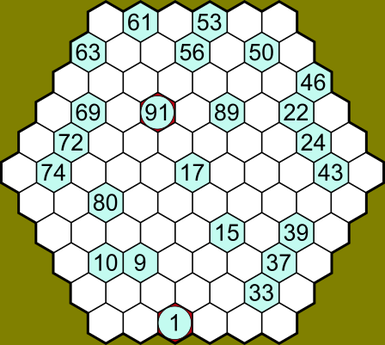|
I'm aware that there have been a few "thoughts and musings" posts lately, rather than anything particularly useful, but I'm happy to say that Beehive Hidato transfers well to the classroom and makes for a nice five-minute puzzle.
The link takes you to an article Alex Bellos wrote on the Guardian about a month ago. After reading that, I printed off the puzzles as a four-per-page worksheet and used as a time-filler towards the end of term. The pupils seemed to find it much more engaging than Sudoku, and I quite enjoy doing them myself! You can get loads to solve online or print out at Hidato.com. Happy puzzling! |
The new sudoku31/7/2015
Another quick post today as I am/will be busy preparing for part two of the wedding celebrations and again am/will be nowhere near a computer (I'm still struggling with tenses - see yesterday's post!).
You know those people that seem to post all the time on Twitter? I've discovered their secret - for me, it was a bit of a necessity if I'm going to manage the #summerblogchallenge, as I got married yesterday and currently have a houseful of people continuing the celebrations until at least Saturday**.
It's a handy little site called Twuffer - you sign up for free with your Twitter account, then simply schedule a Tweet in advance. If you want to schedule a link to a blog post that's not live yet (as I've been doing), you might need a little jiggery-pokery with the url of your post, but it's fairly simple to work out. Something old, something new...29/7/2015 I'll admit to having to cheat a little bit on this challenge; this post is one of the few I had to write ahead of time and schedule to post later. I have a good excuse - I'm getting married today, and I imagine that, even though my fiance is very understanding about the amount of time and energy I put into teaching, even he would object if I blogged during our wedding day.
While I've been organising over the summer, I realised that my resource collection has grown exponentially again this year. I made the move to storing resources electronically this year, which has meant I'm drowning in far fewer bits of paper and it's much easier to find the worksheet I want than rifling through folders. Despite this, I still have my entire cupboard under the stairs full of bits and pieces that need transferring or updating - I think it's going to be an endless task. Finding, developing and trying new resources is one of my favourite parts of teaching, which is one of the reasons I started the resources pages on my site - it's far easier to link to a page at home, then find that again at school, rather than email things to myself, which I then forget about the following year. As above, this project is still unfinished, but I hope to put a big dent in it over the next few weeks. But what makes a good resource? And your starter for ten...28/7/2015 Starters can be a contentious issue; the term "starter" is a hangover from the days of three-part lessons in bite-size chunks, which seem to have fallen from vogue now. However, they are still a key part of my teaching, and today's SBPC looks at why.
In my mind, my lesson "starters" fall into three categories, and they're not mutually exclusive. Sometimes it's appropriate to have a couple of "starter" activities (I'm dropping the quote marks now because I'm irritating myself). I once had a lesson starter that went on for the entire lesson, as it became painfully apparent that the class had completely forgotten to solve simultaneous equations, so my quick prior knowledge check turned into an off-the-cuff revision session. The importance of trust27/7/2015
At the most recent Maths Conference in London, I spent one session sitting at a table with three NQTs, and was asked by one of them what my "top tips" were for surviving their NQT year. For a bit of context, I've now been teaching for six years if you include my GTP year, which I do, as I was thrown in the deep end with my own classes and found that year very challenging. As a result, I found my NQT year relatively straightforward, as I wasn't in the position that many new teachers are: suddenly having to take on sole responsibility for the classes in front of me.
It still baffles me a little bit that people would ask me for advice, as I still consider myself a fairly "new" teacher, but I did my best with a few bits of advice. There are far more comprehensive guides on the Internet - I'd recommend checking out TM4T's NQT guide, which has some fantastic tips for time management. Furthermore, I found it much more useful talking to colleagues working in my school for advice on how they manage day-to-day teaching, as every setting is different, and every school will have different policies and procedures that need to be followed. Regardless, I thought a small series of "Tips for NQTs" might be a good use of some of my SBPC posts, if only to remind myself of the fundamentals of my teaching practice before September. Today's is probably my most important tip: Establish good relationships and trust from the first lessonPick of Twitter 26/07/1526/7/2015
It's been a while since I last did a Pick of Twitter, which is personally quite annoying because it's my only way of chronicling all the good stuff I see on there - I'm going to try and get back into the habit on Sundays from now on!
I decided that a resource post was long overdue for the #summerblogchallenge, so I thought I'd post one of my favourite lessons. I put this together after discovering the fantastic Gapminder website a couple of years ago, and it's designed to provide a nice real-life link for exponential growth.
Looking back, looking forward...24/7/2015
It seems that we all do a bit of reflection at the end of the year. For me, my targets are a bit like New Year's resolutions - I start off well, but most things have fallen by the wayside by October half term. This year, I vowed to keep my room tidy and organise my equipment better... that didn't happen, and I must have bought about ten new boxes of pens from Tesco as pupils just wander out of the classroom with them. My first SBPC post was about just this - my What Went Wells and Even Better Ifs for this academic year.
As the staggered start to the summer holidays means that we all finish at different times (and yes, I am one of the lucky ones!), I'm reading a few great posts at the moment along just these lines. So today's post is a link to some of those. Quantity, not quality?23/7/2015 Today's post is a blog about blogging - does that make it a meta-blog?
I'll start with my fiance's reaction when I told him about the #summerblogchallenge - he was convinced that there was no way I could write 51 meaningful blog posts, and was in danger of just spamming my Twitter feed with rubbish - hence the title of this post. I think he's also concerned that I spent the first day of the summer holidays pre-writing posts and coming up with ideas rather than starting the big it's-the-summer-holidays spring clean of the tip we're currently living in. This got me thinking about what my aims are when I post, and why I do it. When I started blogging this year, I felt a little self-conscious. There are a lot of well-established teaching blogs already out there, and I couldn't see what I could contribute. However, I'm really glad I waded in, as it's really reinvigorated my teaching this year, along with loads of other advantages. So this post is for any on-the-fence would-be bloggers who are debating wading into the blogosphere. How does Bob Marley like his Maths...?22/7/2015 ...With jam in! Badumdum-tshh...
Not sure if that really works, but I enjoyed my first Maths Jam so much last night that I thought it would make a great topic for my SBPC post today. If you don't know about Maths Jam (I didn't until Beth (@MissBLilley) invited me along at the last maths conference), it's a monthly get-together for "maths enthusiasts" in your local area, which understandably attracts a lot of maths teachers. It's also something I wish I'd found out about a lot sooner, as I've been back in Leeds for over four years now, and would have really enjoyed going along to these as I was settling back in and making new friends. Warning: This post contains spoilers for a couple of problems from Solve my Maths. Planning for GCSE 201521/7/2015 Just a quick post today with a few useful goodies for the new Maths GCSE - these are all links I've found useful in planning and resourcing our schemes of work.
Bit of a random topic for my third SBPC, but bear with me. Over the weekend, my fiance dragged me to watch Jurassic World; I wasn't keen, as I missed the Jurassic Park hype when I was younger, and don't really enjoy action films. Since watching Jurassic World, we went back and watched three episodes of Planet Dinosaur - I'd never seen it before and found it fascinating, although the CGI looks a little dated now!
While we were watching it, we ended up discussing the huge time frames involved in the evolution of both dinosaurs and life in general. When I visualise dinosaurs, I imagine all the famous ones like Tyrannosaurus Rex, Stegasaurus and Diplodocus all roaming the planet at the same time. Something that struck me was the phenomenal length of time that dinosaurs in general were on the planet, and the (relative) shortness of the time that each recognisable species was around. I've spent a large chunk of my time over the last 18 months writing a scheme of work for Key Stage 3. I wrote a blog in June about our experiences of a year of mastery teaching and it's a theme I'll come back to in later posts over the summer, as the endless (M)astery debate is getting a lot of air time at the moment. As a side note, it's worth reading Charlie Stripp's blog posts and Andrew Blair's responses for views from both sides of the table.
I decided that today's post for the SBPC (Summer Blog Post Challenge - read here) should be about that journey, and the pitfalls I've met along the way. For a much more in-depth chronicle of writing a scheme, I suggest checking out Craig Barton's 19 part series - it takes a while to read, but has some great tips and ideas if you're in the same position I was a few months ago.
As I mentioned in my last blog post, I've had very little time lately to work on my website and write blog posts; it's a shame because I love doing both. Now that the seven-week summer holiday has arrived (I'm still not sure where that extra week has come from), and inspired by Dr Bennison's "blog post a day" personal challenge, I decided that I would join him and try and write one post each day until I return to school on 7th September.
I'm now slightly regretting signing myself up for this challenge. When I woke up this morning, I worked out that this means I need to write 51 blog posts before the start of September! Normally I have more ideas than time to write posts, but I sat here for about an hour earlier with serious writer's block.
Eventually, I decided that, as we've just finished the school year, it's a good time for both reflection and looking forward. I read a particularly great post along these lines today from Andy Tharby (@atharby), and I'm planning to write a similar one at some point, but I can't quite decide what my "three" are. For the time being, I thought I'd stick with a self-assessment format I'm happier with... |
Categories
All
Archives
August 2020
|









 RSS Feed
RSS Feed
